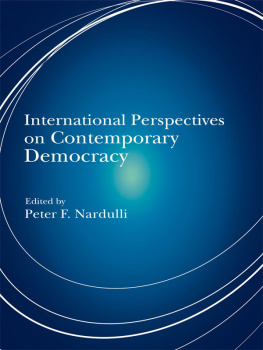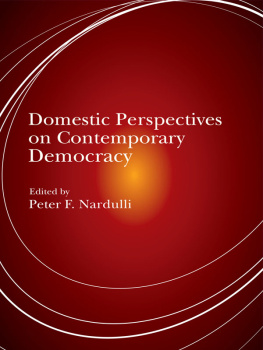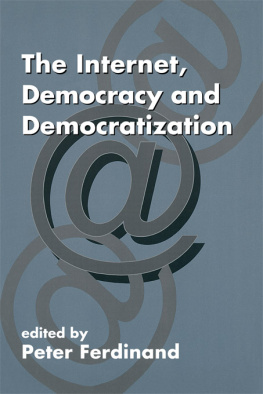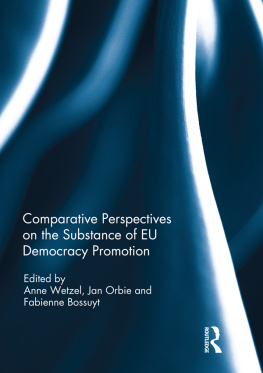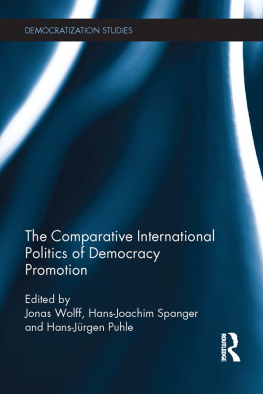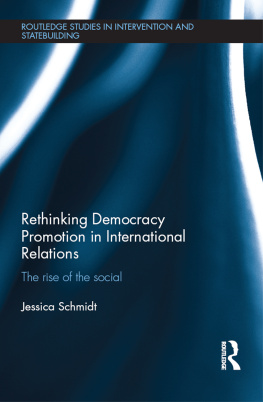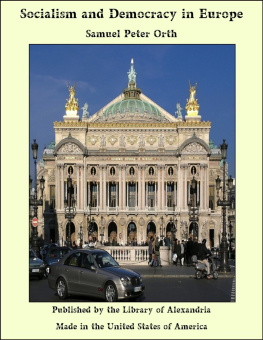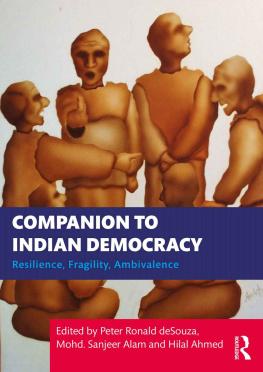International Perspectives on ContemporaryDEMOCRACY, FREE ENTERPRISE, AND THE RULE OF LAW
This series is sponsored by the Cline Center for Democracy, which is devoted to the study of democracy throughout the world, of institutions that sustain and extend it, and of forces that perpetually challenge and endanger it.
Series Editor
Peter F. Nardulli, University of Illinois
A list of books in the series appears at the end of this book.
International Perspectives on Contemporary Democracy
Edited by
PETER F. NARDULLI
UNIVERSITY OF ILLINOIS PRESS
Urbana and Chicago
2008 by the Board of Trustees of the University of Illinois
All rights reserved
Manufactured in the United States of America
1 2 3 4 5 C P 5 4 3 2 1

This book is printed on acid-free paper.
Library of Congress Cataloging-in-Publication Data
International perspectives on contemporary democracy / edited by Peter F. Nardulli.
p. cm. (Democracy, free enterprise, and the rule of law)
Includes bibliographical references and index.
ISBN -13 978-0-252-03335-3 (cloth : alk. paper)
ISBN -10 252-03335-3 (cloth : alk. paper)
ISBN -13 978-0-252-07544-5 (pbk. : alk. paper)
ISBN -10 0-252-07544-7 (pbk. : alk. paper)
1. Democracy.
2. DemocratizationInternational cooperation.
I. Nardulli, Peter F.
JC 423. I 586 2008
321.8dc22 2007030914
To Richard G. and Carole J. Cline, whose vision and generosity made this undertaking possible
Contents
Brian J. Gaines and Peter F. Nardulli
Larry Diamond
Zachary Elkins
Bruce Russett
Lisa Anderson
James H. Kuklinski, Paul J. Quirk, and Buddy Peyton
Wendy Rahn
Beth Simmons
John R. Freeman
Melissa A. Orlie
Preface
As a form of government, democracy enjoys unparalleled prestige at the beginning of the twenty-first century. The most prosperous nations in the world were democracies. Moreover, democracys third wave had generated an unprecedented number of new republics in southern and eastern Europe as well as Latin America. Reflecting on these developments, some see the end of history. They argue that democracy has vanquished its competitors, and that it is the only legitimate form of government in the modern era. Others are more cautious. Mindful of the challenges to democracy in the new century, as well as its ebb and flow throughout history, they envision a more problematic future.
Several salient challenges confront democracys durability and portability: the increasing racial, ethnic, and religious diversity of many societies; the rapid diffusion of innovations in information and communication technologies; and the emergence of global forces and institutions. While these developments present new possibilities for democratic governance, they also have the potential to disrupt its formulation and implementation. Moreover, in conjunction with the demise of the cold-war era in the 1990s, these developments give rise to barriers that could affect the diffusion of democracy beyond its current frontiers. In the twenty-first century the joint effects of these developments could:
affect the ability of individuals to discharge the responsibilities of democratic citizenship;
undermine the commitment and identification of citizens to their domicile;
affect the structure, operation, and legitimacy of institutional mechanisms for linking elite behavior to mass preferences;
place extraordinary burdens on democratic political and civic leaders;
limit the legitimacy of traditional conceptions of democratic institutions in non-Western settings; and
constrain and curtail the actions of democratically elected governments in historically unprecedented ways.
The confluence of two milestone events on the Urbana-Champaign campus of the University of Illinois made it possible to organize a set of activities around these important concerns. One was the centennial of the universitys Department of Political Science; the second was the inauguration of a newly endowed center within the College of Liberal Arts and Sciences, the Cline Center for Democracy. To mark these events the college, the department and the center hosted a week-long conference.
In preparation for this conference, the editor initiated a wide-ranging consultative process to clarify the implications of increasing social heterogeneity, Information Age innovations, and globalization for the health and practice of democracy in the twenty-first century. Once these topics were clarified, he used them in conversations with leading political scientists to identify a wide range of accomplished scholars (comparativists, theorists, political economists, communication scholars, law and society students, etc.) who were equipped to make original and important contributions to the topics. Discussions with these scholars led to new insights and further refinements in the topics to be addressed.
These scholars were then commissioned to prepare original essays that focused on assigned, clearly developed themes for a general academic audience, refraining from excessive jargon and focusing on the big picture. These essays were initially presented in October 2004 in a leisurely collegial setting, and exchanges among the participants were lively and enlightening. The reflective atmosphere was due in large part to the fact that the conference brought together scholars from a variety of subdisciplines, scholars who seldom interact with one another.
A set of discussants was also commissioned to prepare detailed reviews of the papers, which were supplemented by a review written by the editor. The essayists then revised their papers in light of the reviews and the insights gained from the conference. The result is a collection of wide-ranging essays that make original and important contributions to issues facing democracy at the beginning of the twenty-first century. This volume examines two cross-national phenomena: the prospects for a fourth wave of democratization and the challenges that globalization poses for democratic governance. The companion volume, Domestic Perspectives on Contemporary Democracy deals with two issues that affect mass-elite linkages within democratic societies: social heterogeneity and Information Age challenges.
International Perspectives on Contemporary DemocracyInternational Perspectives on Democracy in the Twenty-first Century
BRIAN J. GAINES AND PETER F. NARDULLI
This volume touches some truly profound and fundamental questions about the future of democratic governance in the upcoming century. One subset of questions derives from matters that cloud the prospects for continued democratization (i.e., Will a fourth wave of democratization emerge?). The nations yet to embrace democracy include some of the poorest and socially most heterogeneous nations in the world (i.e., those in Central Asia and Africa). Others have cultures and traditions that will make the emergence of democracy challenging, to say the least (i.e., Arab states in the Middle East, China). If democracy is to spread beyond the reaches of the third wave, what will drive it?
The literature on democratization has traditionally placed a great deal of emphasis on intranational factors (level of economic development, the structure of class alignments, cultural factors, elite motivations, etc.). But it is hard to see intranational factors driving democracy movements in the existing set of nondemocratic nations. Thus, if a fourth wave is to emerge, it is most likely to be driven by extranational factors. This extranational scenario, however, raises a set of difficult questions. Can extranational influences have enduring effects on domestic governance structures? What types of extranational influences are most likely to effect domestic changes? Are some extranational strategies for fostering democratization more effective than others? Under what conditions are these strategies most effective? Are these conditions likely to exist in the twenty-first century?
 This book is printed on acid-free paper.
This book is printed on acid-free paper.
